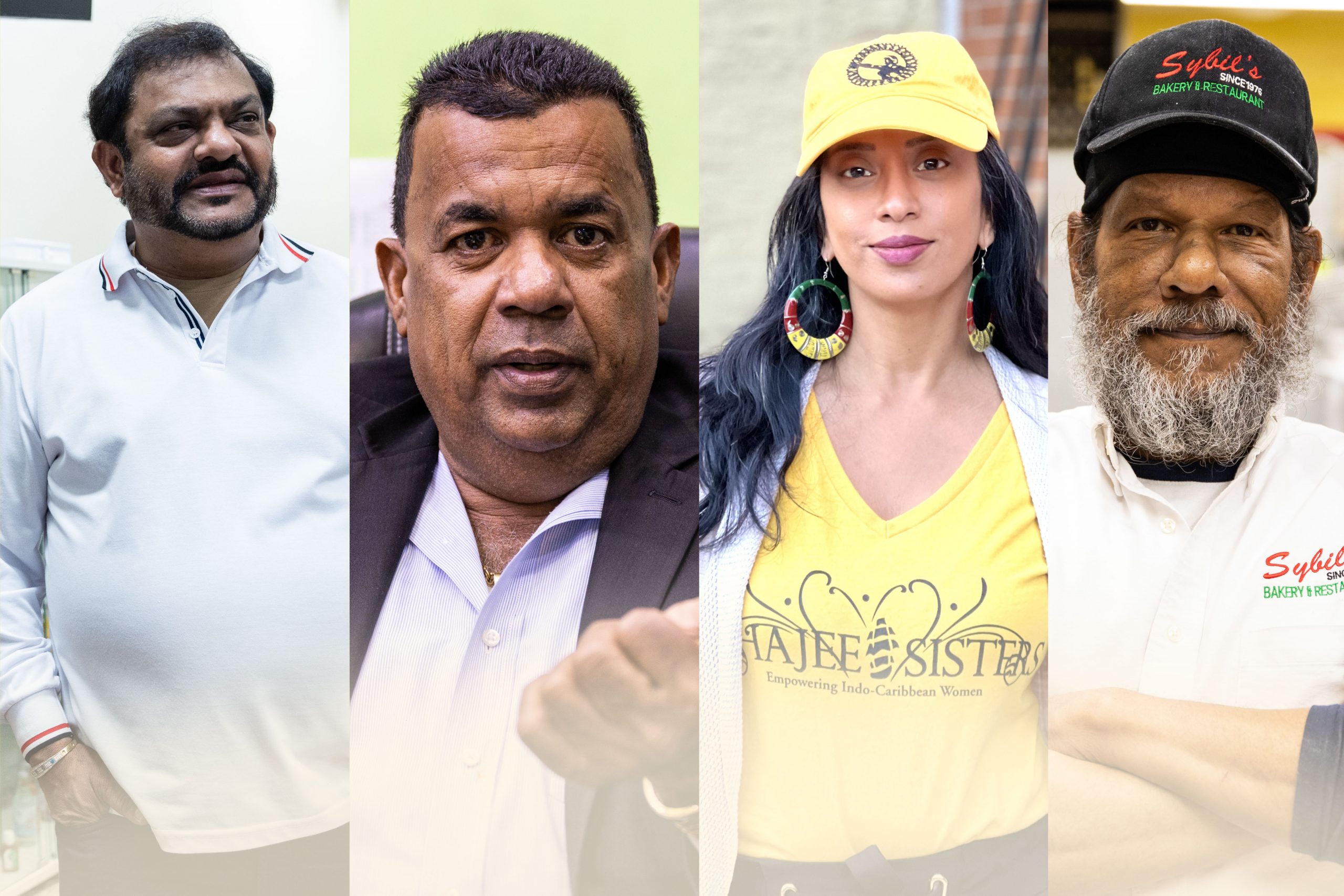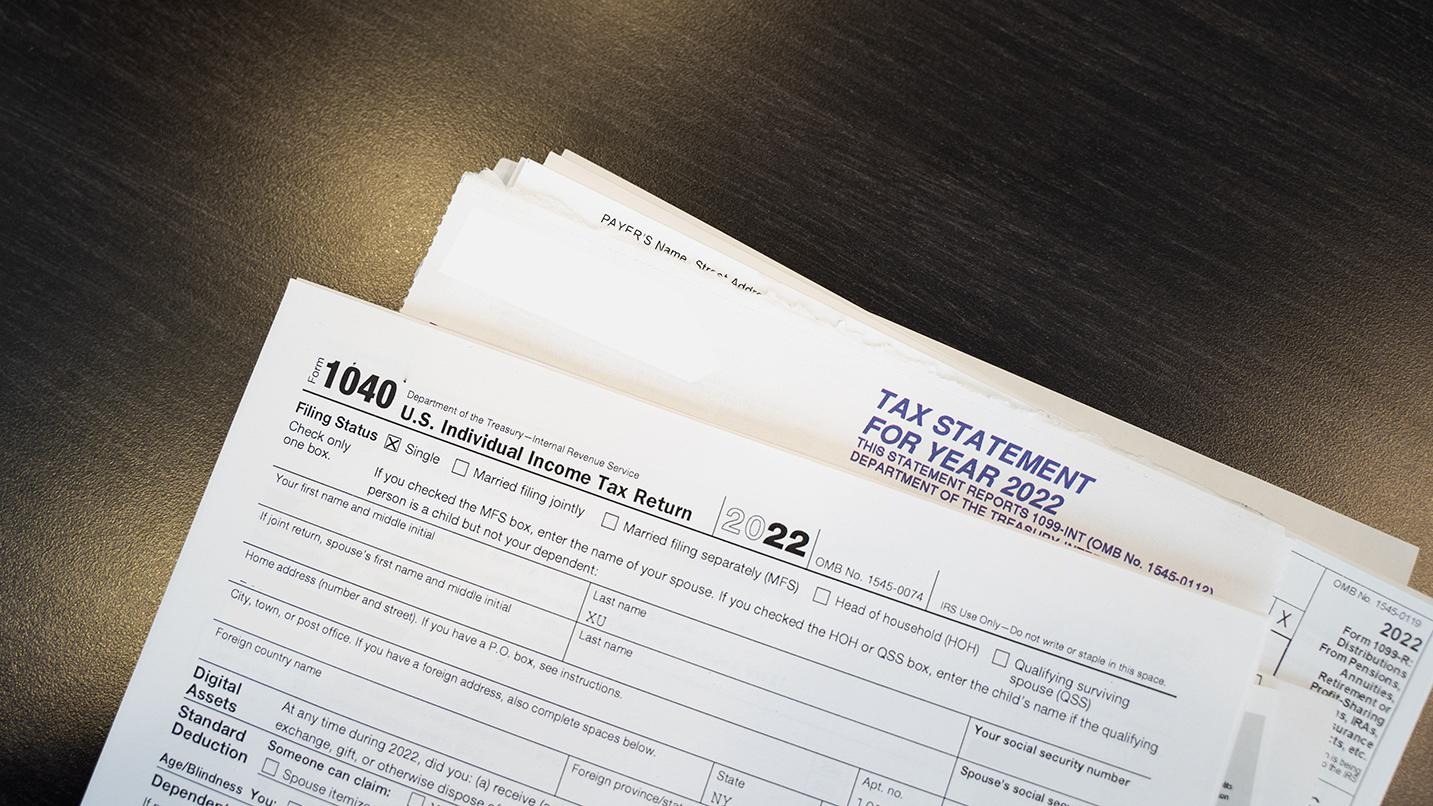Leading up to Caribbean Heritage Month, Documented spent two months in Queens visiting Guyanese New Yorkers to hear from them about their life in the city. We spoke with businesspeople, workers, worshippers, and cultural ambassadors who, for years, have had a huge influence on the city. What follows are some of the sights, sounds and stories we found in and around Little Guyana, including iconic places, influential figures, a passionate activist, and vibrant cultural spaces that form the heart and soul of this dynamic community.
First, some background.
Indo-Caribbeans are people of Indian descent who live in Caribbean countries such as Guyana, Trinidad and Tobago, Suriname, Jamaica, and other islands. The term highlights their cultural and ancestral connection to India and Caribbean identity.
In 1840, slavery was abolished in the British West Indies. The British, seeking cheap labor, began bringing East Indians to the region en masse to work as indentured laborers in sugar plantations in Guyana, Trinidad, Suriname, and Jamaica. They brought with them their cultures and traditions from India.
In 1965, the United States passed the Immigration and Nationality Act which abolished the national origins quota system, and allowed a broader range of immigrants to enter the U.S. In the 1980s, about 8% of the Guyanese population moved to New York City due to the worsening economic and political conditions of the Caribbean nation.
About 140,000 individuals of Guyanese origin live in New York City, making them the city’s fifth-largest immigrant population and second-largest in Queens, according to the 2019 American Community Survey by the US Census Bureau. The majority of Guyanese have established themselves in Queens, especially in the Richmond Hill neighborhood.
The community is recognizable by its mix of roti shops selling the traditional Indian round flatbreads and the mandirs where Hindus go to worship. There are also many mosques, Christian churches, restaurants, and boutiques. In June 2021, the Richmond Hill intersection of Lefferts Boulevard and Liberty Avenue was named Little Guyana. But the city’s Guyanese community extends far beyond that.
A bakery and a beacon of the community
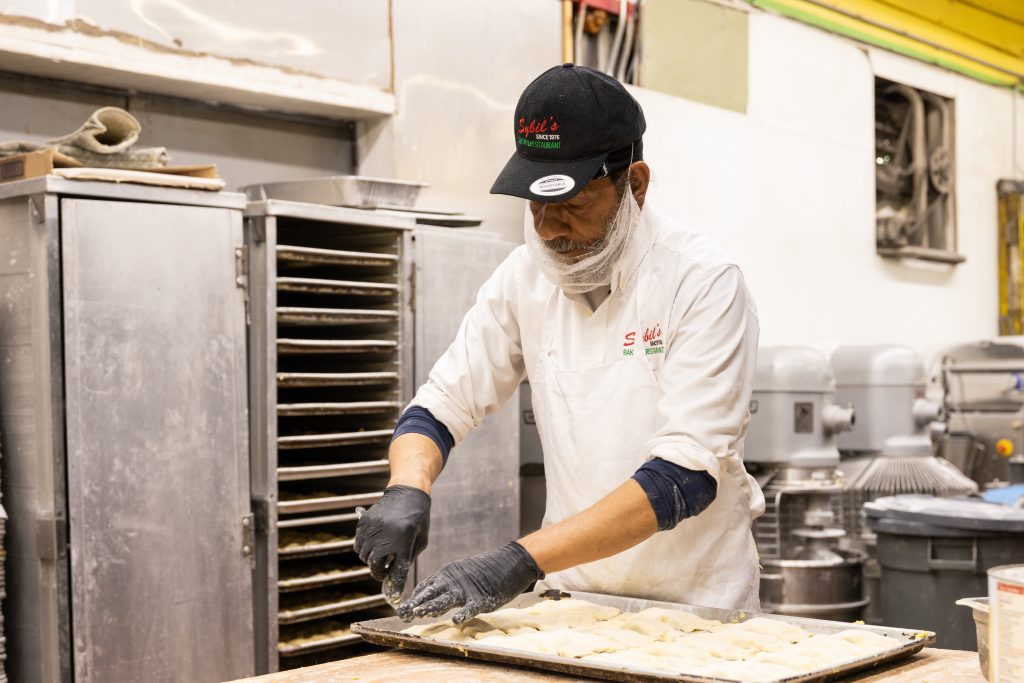
At 159-24 Hillside Avenue in Jamaica, Queens, you’ll find Ken Bernard skillfully kneading dough with expertise at Sybil’s. He pinches together cheese rolls and guava and pineapple tarts, then tends to the jerk chicken simmering on the stove. He meticulously applies icing to a homemade carrot cake, slices it into portions, and carefully places each piece into a plastic container adorned with a “Sybil’s” label.
“I’ve been doing this for about 50 years, and I wish I could do this for another 50 years,” he said. His gaze often shifts towards the front of the establishment, where customers make purchases and inquire about his creations.
Sybil’s has been Ken’s only job since his childhood, and he manages the Jamaica branch. He describes the brand as “an authentic Guyanse bakery and restaurant.”
The establishment’s origins trace back to 1976, when Ken’s mother, Sybil Bernard-Kerrutt, a Guyanese immigrant, started baking at home after losing her job in a jewelry shop in Manhattan.
Sybil arrived in New York In 1969, seeking a better life for herself and her nine children. When they first arrived, they lived with Sybil’s brother, David Pherie, who had eight children of his own. The seventeen children and three adults all lived together on 169th Street in Jamaica, Queens.
“We came here very dirt poor people,” said Sybil’s second eldest son, Viburt Bernard. The 67 year old manages the Richmond Hill branch, in Queens. A painting of his childhood home hangs on his office wall.
Like his mother, Viburt used to go to work as a jeweler in Manhattan at the age of 20. His younger siblings stayed home with their mother to cook the food and make the bread and pastries for the business. They would wait for Viburt to get off the train at 67th Street, so by the time he arrived home, he could help roll out the dough.
“We all had a hand in it,” said Ken Bernard, Viburt’s younger brother.
These days, Sybil’s operates in three locations. Viburt expanded the Richmond Hill branch to create Veggie Castle, a vegetarian restaurant, and his son Bryan works as a baker. Another brother, Robert Bernard, runs a Sybil’s branch in Florida.
“I used to pray for a green card, a car, and $10,000”
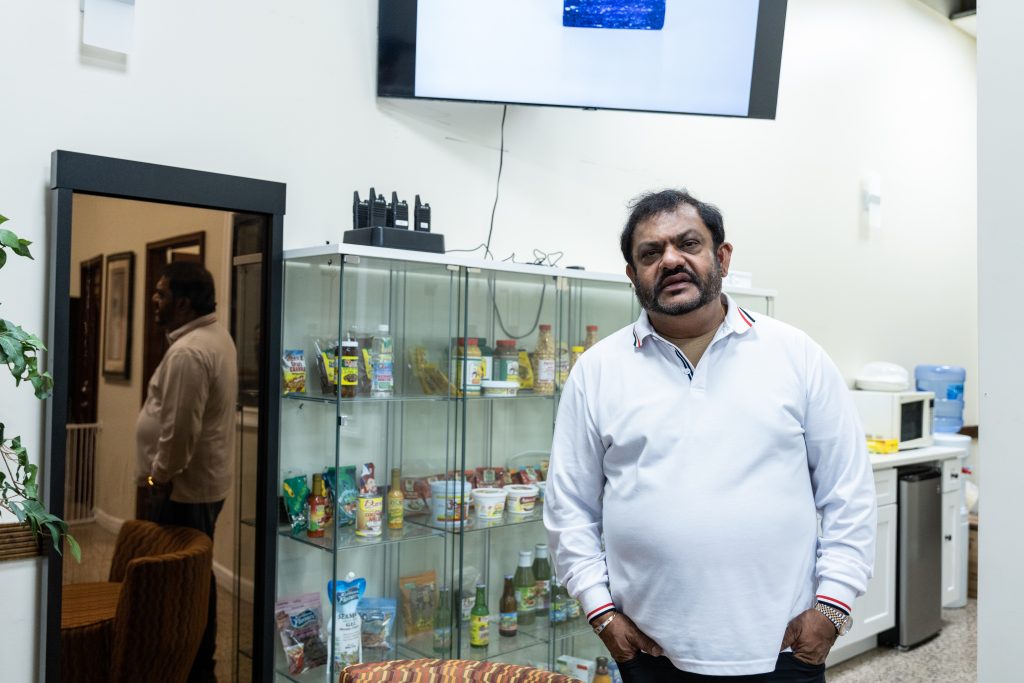
In 1986, when Sybil’s was celebrating its first decade, Dave Narine landed in New York City, fleeing Guyana’s economic and political strife, like many other Guyanese citizens. Narine had seen many people from his town, Number 60 village in the East Berbice-Corentyne region, make a decent living in the United States.
“I came from very poor and humble origins,” he said.
Narine overstayed his visa and worked in many kinds of jobs, even selling a friend’s caramel biscuits from his car. Within four years, he got his green card after marrying a U.S. citizen.
Now, Narine is the owner of Dave West Indian Imports, which distributes more than 200 Caribbean products across the United States, including frozen juices, seasonings, channa, chow mein, curry powder, Garam Masala, and dried fruit. His brand powers many Caribbean restaurants, roti shops, and markets. In addition, Narine owns a seafood market and three florists.
His business extends to Trinidad and Jamaica, where he’s a shareholder in Spur Tree Spices. He said he and several associates founded the business with just a blender and about $5000. Eventually, Spur Tree made it to the Jamaica Stock Exchange.
“In the first year [in the USA], I remember praying and asking God for a green card, $10,000, and a car,” he said.
At the time, he was earning $95 per week. Now, he values his businesses at $25 million dollars.
Narine sponsors cricket teams in Guyana, including an under-15 league and the entire Berbice County second division. His office walls are adorned with photos of cricket athletes and officials from Guyana and New York.
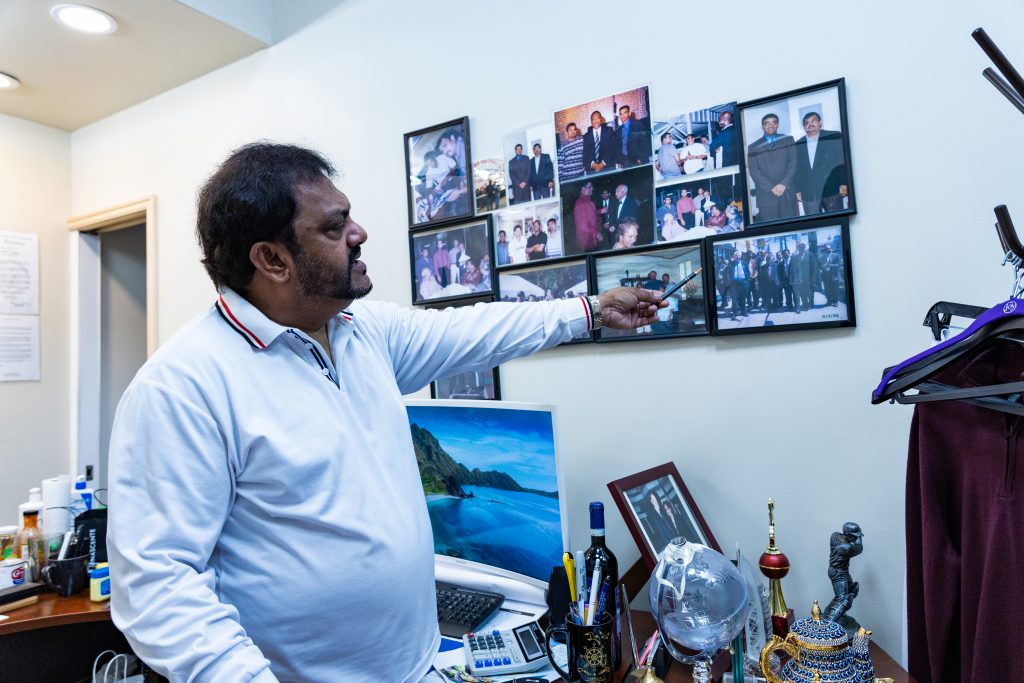
From farmer and fisherman in Guyana to business owner in Queens
One Indo-Caribbean business that buys from Dave West Indian Imports is the Rockaway Roti Shop. It’s located on the corner of Rockaway Boulevard and 123rd Street. Its building houses a catering company, a taxi service, and a party hall. Jameel “Hafeez” Ali owns all of them.
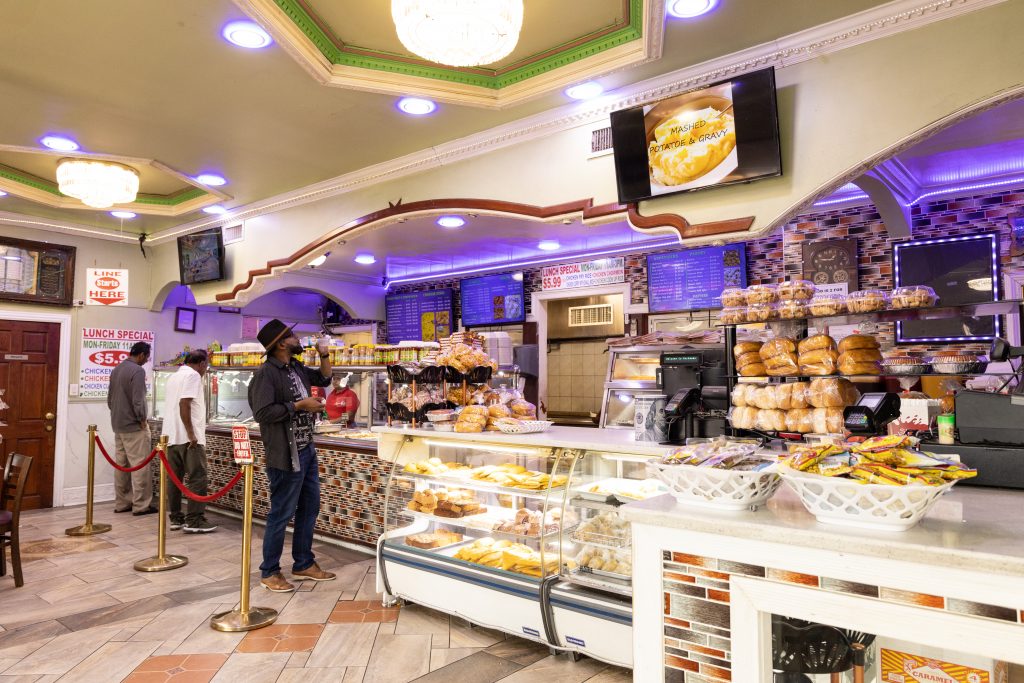
He grew up as a farmer in Guyana, working the land after school. In 1982, he said the government took the land his family has been planting for decades. To survive, Ali said he became a fisherman, a job that didn’t pay much either. Eventually, he decided to leave Guyana.
“I came here [to the USA] with a determined mind,” Ali said.
His first job was pumping gas. After realizing his salary wasn’t enough, he worked as a taxi driver. “When I picked up a passenger I didn’t know where and how to go. They told me how to go. And I figured my way to come back,” he said.
Ali opened Rockaway Roti Shop in 2004 in a space that used to be a gas station. He saw the increasing Guyanese population in Queens and noticed a gap in the South Ozone area. He opened the Roti Shop to provide another option for authentic Guyanese food. He plans to retire in 2024 when he turns 60, leaving the business in the hands of his three children.
“I’ve been working very hard since I was a kid. It’s time for my children to take over,” Ali said.When he’s not attending classes at Molloy University, 22-year-old Javed Ali, already helps his father run the shop. Javed’s Trinidadian girlfriend, Sydney Shah, is often there to help out as well.
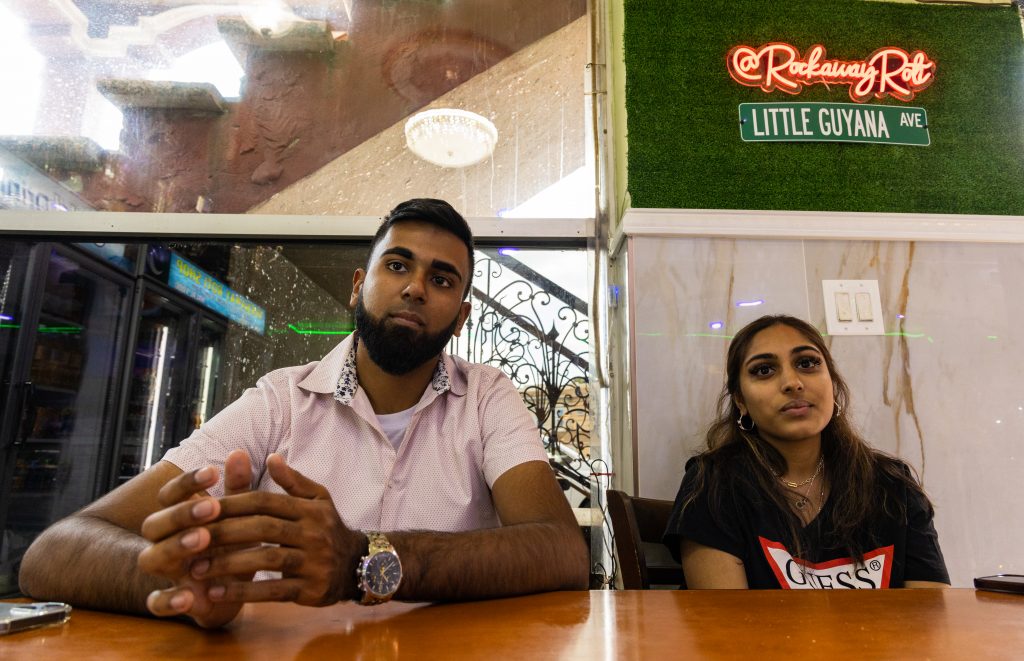
Javed was born in the United States, but he goes back to Guyana with his father three to four times a year. Javed said that he is fully aware of the hardship his fatherwent through, and he is ready to take more responsibility in the family business.
“But there will always be one or two obstacles for which you’ll always need him. There’s always something that you cannot do that he would always find a solution for,” he said.
Standing up for the community
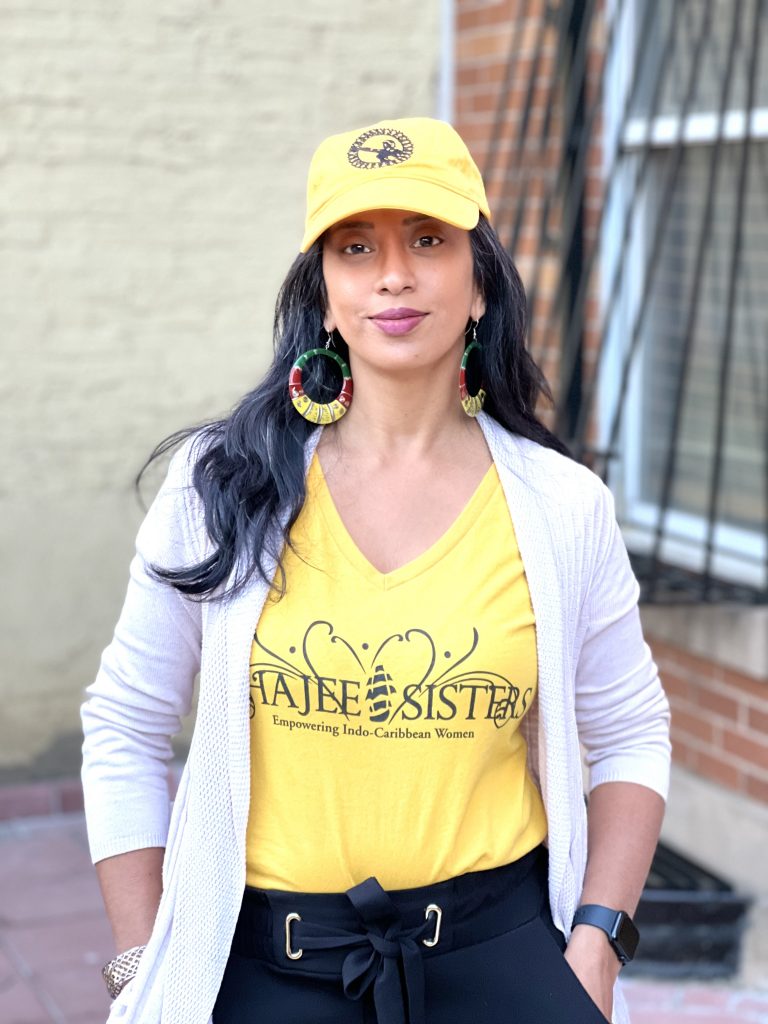
In 2007, the brutal murders of two Guyanese women in Queens prompted Simone Jhingoor to take action. With three colleagues, she co-founded the Jahajee Sisters, an Indo-Caribbean organization dedicated to addressing gender violence and empowering women, girls, and gender expansive people in the community. The organization raises awareness and advocates for a safer and more supportive environment for Indo-Caribbeans in New York.
“Jahajee means ‘people of the boat,’” Jhingoor explained. The name is inspired by her ancestors from South Asia who were brought to the Caribbean to work as indentured laborers. On the ships en route to the Caribbean, they identified themselves as Jahajee Bhai and Jahajee Bahen, meaning ship brothers and ship sisters.
Jahajee Sisters has headquarters in Richmond Hill, Queens, and another branch in the Bronx. The organization assists women primarily from Guyana, Trinidad, and Suriname.
Jhingoor credits an older woman who visited houses of worship, where women were sharing their experiences of abuse, for inspiring the concept of a safe space for Indo-Caribbean women to express their voices.
“A lot of the women who come from Guyana, Trinidad, don’t have any family and friends here. So, having that sense of community is like a lifeline,” Jhingoor said.
She was born in New York to Guyanese parents and grew up in Castle Hill in the Bronx. Her activism began to take root when she was in high school, after she saw racial and social injustice in New York, including a police shooting that rocked the city and reverberated around the globe in 1999.
“The catalytic moment for me was when Amadou Diallo was shot 41 times not too far away from where I lived,” she said. After Diallo’s tragic murder, Simone joined Blackout Arts Collective, a group of artists who used their art to speak out against racial injustice.
“I always saw domestic violence in my own family and a lot of gender injustice,” she said.
Since its creation, Jahajee Sisters has held monthly healing and wellness circles where women and gender non-conforming Indo-Caribbeans share their experiences and create solutions together. The organization has an emergency fund through which victims of abuse and their children can benefit from small grants for their safety.
The Jahajee Sisters are among several Indo-Caribbean organizations in Queens that focus on the needs of immigrant women and children to help them adapt to life in New York.
“People just don’t know about us [Indo-Caribbean immigrants]. We are so marginalized and disenfranchised,” Jhingoor said.
In 2021, during the peak of the Covid-19 pandemic, Richmond Hill and South Ozone Park had the highest number of positive cases in Queens.
A community of many faiths
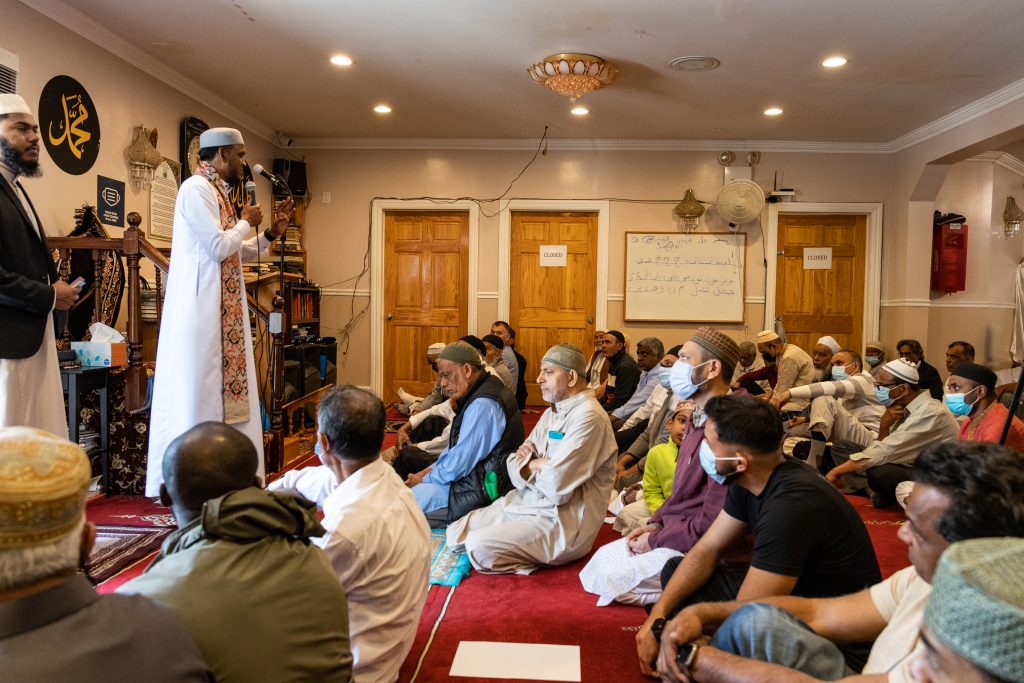
On a recent Saturday afternoon, the prayer room at the Masjid Al Abidin was packed with men in thobe robes, but they were there for a community event, not a religious service. Imam Safraz Bacchus made sure that everything was in order before the prayer, while a city employee was on hand inviting the attendees to cast a participatory budgeting vote, which gives them a say in how part of $5 million in city funds could be distributed in their community.
The Masjid was established in 1977 because Muslim Indo-Caribbeans used to gather and pray in their basements. Now, a $4 million construction project is underway to expand their mosque on the corner of Liberty Avenue and 127th Street to house the growing number of Muslims in the community.
Imam Bacchus has been running the place for a decade, but has known the community for much longer. After his theological studies in Egypt, he returned to Guyana and occasionally came to New York to connect with the Guyanese community there. (Sixty-four percent of Guyana’s population is Christian, 25 percent Hindu, and 7 percent Muslim — mainly Sunni).
Imam Bacchus recalled that the Liberty Avenue area used to be “a slum, so to speak, filled with drugs and social problems.” But after the mosque was established, he said many Muslims came to the area and changed the community dynamic. The name “Masjid Al Abidin” means literally “a place of worship,” the Imam said. But, more than a prayer space, the mosque provides various community services to immigrants, especially the Guyanese.
“It’s a place that provides spiritual support, emotional support, social support,” he said.
Just a block from the Liberty Avenue mosque, is the Shri Lakshmi Narayan Mandir, a Hindu temple that welcomes worshipers every Sunday morning. Like the mosque, the temple is frequented mainly by Guyanese and some Trinidadians, and is also a place to strengthen community bonds.
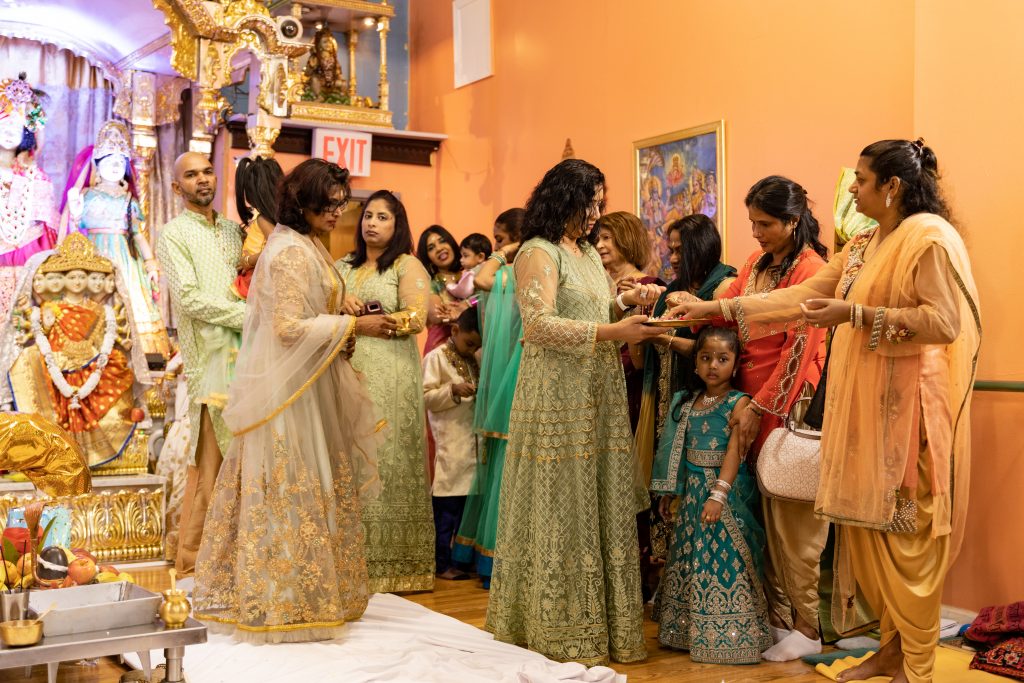
The temple was built in 1985, according to Ram Jadonath, a Guyanese cardiologist living in New York since 1976. Jadonath said his father was one of the most active people in the mandir establishment.
Each Sunday, the Shri Lakshmi Narayan Mandir holds a Puja, a ritualistic worship ceremony where people express devotion, reverence, and gratitude to deities. After the Puja, attendants go to the basement, where they always share a meal together. According to the temple’s leader, Pundit Narayan Hatchana, the mandir is a safe place for Hindus, and for immigrants.
“It provides more peace, more satisfaction, generates positiveness to cope with challenges in life,” he said.
